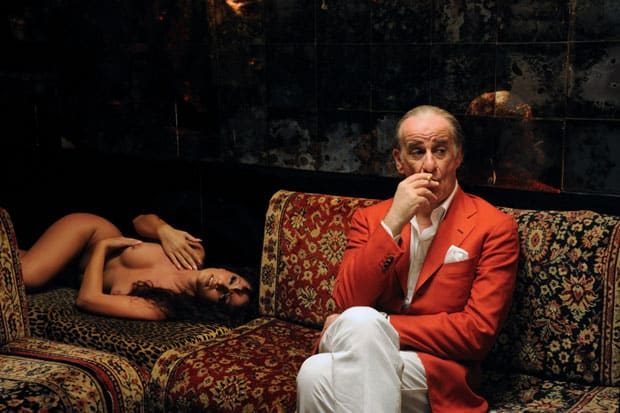The director of this magazine and I argued a bit over whether to include this film review. I was concerned that probably only 10% of you would actually have seen or have interest in seeing the film, as it hasn’t been released yet with English subtitles and it’s not necessarily a portrayal of Rome visitors to the city can identify with. This is no Woody Allen or ‘Eat Pray Love’. You will probably only appreciate the exceptional talent of director Paolo Sorrentino if you have lived in this city, been to the parties, understood the richness and restlessness of upper and middle class Romans. You need to have luxuriated on a private rooftop in the centro storico between 3am and sunrise, partaking in dialogue paradoxically pretentious and enriching, stimulating and capable of inducing lassitude. Being a lover of both film and Italy, I was always going to be predisposed to an emotional response and sure enough, as the credits flashed up on the screen and the camera lingered over the Lungotevere at dawn, Romans filed noisily out of the cinema and I remained in my seat, enchanted, tears spilling down my cheeks. It’s not a tragic ending and you’re going to think me melodramatic when I tell you this, but there was so much beauty and so much truth in ‘La Grande Bellezza’ that I felt utterly overwhelmed.
I remained in my seat, enchanted, tears spilling down my cheeks…
 I’ve since spoken with many who had the opposite response – they felt it was too long, they felt he created scenes that don’t really happen in Rome… but I disagree. It’s rare that any artist – journalist, poet, photographer or filmmaker is successful (or even has the desire) in presenting both the beauty and la bruttezza (the ugliness) of Rome. Visually it’s consistently a love affair with the city, however, the central character, a man who leads a life of decided decadence, isn’t immune to the frequent emptiness of such a lifestyle, and this is where the film departs dramatically from anything Italophiles would have seen come out of Hollywood. The reaction from Romans is mixed. Romeing director Antonio, for example, was in raptures over the secret places you see throughout, such as Villa Medici by night. So much so that the evening he saw this film, apparently he emerged from the cinema, left his scooter parked and decided to walk home, such was his longing to reconnect with this city he’s lived in for over a decade; to take in its bridges, palazzi and colours more closely.
I’ve since spoken with many who had the opposite response – they felt it was too long, they felt he created scenes that don’t really happen in Rome… but I disagree. It’s rare that any artist – journalist, poet, photographer or filmmaker is successful (or even has the desire) in presenting both the beauty and la bruttezza (the ugliness) of Rome. Visually it’s consistently a love affair with the city, however, the central character, a man who leads a life of decided decadence, isn’t immune to the frequent emptiness of such a lifestyle, and this is where the film departs dramatically from anything Italophiles would have seen come out of Hollywood. The reaction from Romans is mixed. Romeing director Antonio, for example, was in raptures over the secret places you see throughout, such as Villa Medici by night. So much so that the evening he saw this film, apparently he emerged from the cinema, left his scooter parked and decided to walk home, such was his longing to reconnect with this city he’s lived in for over a decade; to take in its bridges, palazzi and colours more closely.
Rome is a city irresistibly stimulating for any creative or aesthete and yet, simultaneously, comes with a lifestyle and a crowd that crushes ambition…

Conversely, I read a scathing review on the political and social commentary site Dagospia.com, which accused Sorrentino of a completely fabricated and inaccurate depiction of the city and what it’s like to live here. I think to an extent, people who are critical of all the film’s crazy dance-till-dawn parties and meaningless sex between people with too much time, botox and money, like to criticize it for one of two reasons. Either it makes them defensive because they see themselves reflected on screen and find it too confronting, or on the other end of the scale, it unnerves others to think that they’ve lived in Rome for years and spend every night watching La Iene, going to bed at a reasonable hour and never receiving a single invitation to one of these exclusive orgies of art and hedony.
Personally I have encountered scenes, conversations and characters exactly like those ‘imagined’ by Sorrentino. Rome is, in many cases, a city irresistibly stimulating for any creative or aesthete and yet, simultaneously, comes with a lifestyle and a crowd that crushes ambition. It makes one feel that frequenting aperitivi and whiling away time philosophizing on a terrazza is a justifiable way to defer ever actually creating anything of beauty. And in spite of this theme, you come away from the film desperate to stay awake until sunrise, wander Rome’s depths and take in all its dirty little secrets. Perhaps I’m such a fan because as a writer who suffers from procrastination, I’ve spent so much of my time walking aimlessly or pedalling over cobblestone on my bicicletta and being an observer. An early scene in the film that haunts me still is when this eternally social and utterly dissatisfied protagonist wanders through the centro storico in the quiet of the morning. They capture the ethereal sunlight as it plays on the earthy terracotta tone of the palazzi, countered by the pristine white of nuns’ habits and angelic children laughing. It’s all in contrast with the debauchery of Rome by night – from cocaine and DJs to scenes of a nun carefully picking vivid orange fruit with no sound but the lazy summer hum of cicadas. Some might say this juxtaposition was too obvious but really, do people always have to complain? Basta. He made me fall deeper in love with Rome while ever-conscious of her defects. That is no easy feat.





